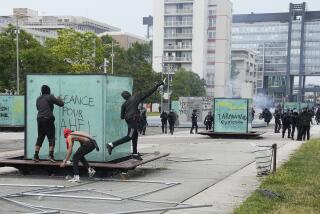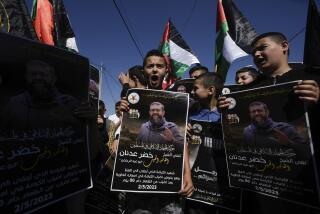Lawyers Threaten to Take Rights Dispute to Cairo Streets : Egypt: The death in custody of an Islamic attorney and detentions of dozens more spark demand for investigation.
- Share via
CAIRO — Abdel Harith Madani had made a name for himself as a young Islamic lawyer, defending clients accused of battling to overthrow the government of Egypt and successfully challenging a public school ban on young women wearing the black face veil of strict Islamic modesty.
He had also experienced more than his share of scrapes with police in his native village in southern Egypt, getting himself arrested a few years ago for trying to keep mourners out of graveyards, a practice viewed as pagan by Islamic fundamentalists.
Then, on April 26, more than a dozen police officers stormed Madani’s law offices, searched his files and led him, blindfolded, back to his tiny apartment in the dusty slums of Qunaissa near the foot of the Pyramids.
There they searched him again. Then they took the 32-year-old lawyer away. His wife heard nothing more until May 6, when the police phoned and told her to collect her husband’s body. His coffin had been sealed. His grave has since been put under armed police guard.
Authorities say Madani died of an asthma attack. His family and colleagues say he was tortured to death. The dispute threatens to unfold on the streets of Cairo today, when thousands of lawyers, who paralyzed the Egyptian courts in a nationwide strike Sunday, have threatened to rally to demand a full investigation and the release of 34 of their colleagues detained in Egypt’s prisons without charge or trial.
While countries like China and Haiti are receiving the bulk of recent U.S. expressions of concern about human rights, Egypt--America’s key Arab partner in the Middle East peace process--has quietly arrested 20,000 to 30,000 political prisoners, activists here say. They say the Egyptians have executed more than 35 convicted extremists after widely criticized military trials since 1992 and launched a law enforcement crackdown against Islamic terrorism. It has led to the deaths of dozens of suspects in blazing raids on their hide-outs.
Almost every major human rights group in the world has criticized Egypt’s widespread use in its prisons of torture and inhumane treatment, including dog attacks, rape, electric shock and reports of filthy water being injected into prisoners.
Lawyers for the fundamentalist-controlled Egyptian Lawyers Syndicate say their own interviews with doctors who examined Madani found signs that he had been subjected to electric shocks, hit on the head and hanged by the feet.
His case is by no means the first in which a professional has died in police custody. But because Madani was a lawyer for Islamic fundamentalists, the stage has been set for a confrontation between the government and one of Egypt’s largest professional associations.
The controversy also underscores the government’s increasing suspicion of lawyers who represent Islamic extremist defendants.
It raises many issues similar to those that have long dogged American lawyers who represent those in organized crime: Are they merely defending suspects accused of extreme crimes? Or are they acting as the legal facade for organizations banned because of their determination to overthrow the government and install an Islamic state in Egypt?
A hint of what may be in store today--if the planned protest here occurs--arose Sunday, when truckloads of riot police surrounded the lawyers syndicate headquarters and prepared at one point to lob tear gas into the courtyard as angry demonstrators shouted: “What a shame! The Interior Ministry is run by a donkey!”
Under Egypt’s controversial 13-year-old state of emergency--in place since the 1981 assassination of President Anwar Sadat by Islamic extremists--virtually all public demonstrations are illegal. Protests are quickly, often violently, curtailed.
“This is not negotiation. This is not bargaining. We will go out into the streets unless the state complies with our request. We will face security, even if it meets us with bullets,” declared Mokhtar Noah, a prominent Islamic lawyer who is leading the campaign for an investigation into Madani’s death.
The Interior Ministry, the agency responsible for internal security in Egypt and overseer of its police forces, has said Madani developed breathing difficulties and fainted during a search of his second home. He was taken to the prison ward of a hospital in downtown Cairo, where he died of respiratory failure linked to asthma. He “died of an asthma attack, and it has nothing to do with torture,” Interior Minister Hassan Alfi said.
The government says Madani was acting as a conduit between imprisoned members of the Gamaa al Islamiya, the outlawed Islamic Group, and their terrorist agents outside. It said Madani is believed to have received more than $15,000 from the alleged leader of the Gamaa’s military wing, Talaat Yassin Hammam.
Hammam, sentenced to death in absentia in a case involving several former fighters in the Afghanistan civil war, was killed along with six colleagues during a dawn raid on his hide-out at dawn on the day before Madani’s arrest.
But Kamel Khaled, a lawyer and member of Parliament, said Madani had recently been trying to negotiate a truce between Gamaa al Islamiya and the government.
Khaled said Madani’s message was that the group had realized it was being manipulated by countries outside Egypt and was ready to call a truce.
More to Read
Sign up for Essential California
The most important California stories and recommendations in your inbox every morning.
You may occasionally receive promotional content from the Los Angeles Times.













